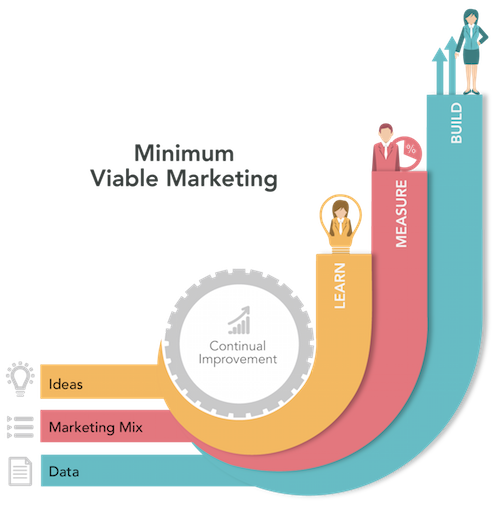Agile marketing is a pragmatic and adaptable way of taking marketing ideas, testing them and validating fast. It helps to maximise marketing effectiveness by building on what works best in order to deliver the right result.
Agile marketing is particularly effective for B2B marketing, benefits include:
- Reducing waste by only using the marketing elements that work best saving budget and time
- Testing innovative ideas in a controlled way
- Continually improving the marketing mix to drive results that meet the business goals
- Reducing costs through greater budget control and accuracy
- Improving speed to market to build market share
- Allowing teams to work autonomously and have a clearer understanding of priorities
- Data driven decision making – fact based, not gut feel
Then you can do more of that and less of the activities that don’t add any value. Understanding what is effective is a key trait for the modern marketer, orchestrating the best possible marketing mix by blending the effective components and discarding those that don’t help you meet your objectives.
If you are selling high value, complex products or services typically targeting senior decision makers they will expect a more personal relationship with any potential supplier.
This has to be built with personalised and tailored messaging and supported with evidence of your credentials. This is time consuming and expensive to manage and maintain, so you certainly don’t want to waste your time on activities that don’t deliver the right results.
There is a huge amount of wastage in traditional marketing – with such investment in planning and preparation up front, marketers are often only just validating the proposition and messaging with their audience as part of a large campaign.
Let’s take a typical campaign for an IT consultancy:
- The business develops a proposition idea and it’s agreed that this is a priority. A go to market strategy and marketing campaign need to be developed, fast
- Go to market preparation and campaign planning begins including defining a full marketing mix
- Campaign elements are created including data building, writing content, designing collaterals etc. – this can be time consuming and costly
- Big push / launch to go to market – elements executed into market based on a defined timeline
- Campaign measured and results analysed
So what is wrong with this picture? Well for a start you have invested a considerable amount of resource and effort before the proposition has been tested with your target audience. Are they in fact the right target for this proposition, did you even check?
You invest budget in creating campaign assets based on an untested message…you wait and see on the results. Of course the modern marketer is always trying to analyse and learn from results but can such a front loaded process really allow for a true understanding of how the proposition is landing with prospects? Or accommodate more creative ideas to be included and tested with a small sub set of the target group before you go for the wholesale campaign to your entire target database?
Whereas a typical agile marketing process is an iterative process right from validating the proposition idea or the campaign theme with a small group; honing it, discarding poorly performing elements such as messages or calls to action that just don’t resonate or interest the target audience.
Then adding more to the marketing mix, extending the audience etc. to expand the successful elements. It constantly measures results and evaluates against the business, marketing and campaign objectives.
Enabling experimentation and fostering curiosity makes agile marketing even more valuable. Giving you the ability to experiment and measure new ideas, this is particularly useful when you want to take a radical new approach but want to avoid the costs of a traditional campaign or the risk of alienating key target segments. Agile marketing can really help at two key stages:
- At the inception of a new proposition or campaign, experimenting with new channels, audiences or tactics on a small scale to prove or disprove effectiveness enables marketers to quickly get into market and drive results
- To reinvigorate existing propositions or campaigns where marketing impact is in decline. Using an agile approach to try out some new ideas with a sub set of your target audience can give fresh insight and successful elements can be rolled out across the campaign
As agile marketing is data driven and focuses on exploiting the marketing elements that perform best you continually improve results as you move through a campaign.
You can start with a minimal level of activity which helps you go to market quickly, measuring as you go. Adjustments can be made based on the results and new elements added, measuring the impact of each one.
The idea is to gradually layer the marketing mix with high performing elements that contribute to meeting your objectives and business goals.
When you use agile marketing you still have to agree and commit a budget but as you are continually measuring and learning, the return on investment becomes easier to foresee and quantify.
Digital tools lend themselves particularly well to agile marketing such as paid search or online advertising strategies – where a small budget pot can be allocated to validate the approach before a more sustained investment is made once the tactic is proven.
Core campaign components such as content can be expensive but by validating which elements of the messaging, topic or theme resonate most, any further investment is focused on additional content that will drive results.
Marketers should always set up metrics to report and understand the success of the marketing initiatives being undertaken. The difference with agile marketing is the continual learning and improvements mean any underperforming activity can be reviewed, changed and turned into an element with positive return. Budgets can be more accurately planned as you learn more about the value and return from your marketing activities.
Getting to market fast or first can be a key advantage for firms in fast moving environments such as tech consultancy or products. Agile marketing enables a rapid time to market by going to market with a minimal marketing mix and building on it. This means you can start to grow market share and build your brand whilst investing in the marketing elements that work best.
Building a results focused marketing strategy is streamlined by adopting agile ways of working, giving you the chance to innovate and enhance your marketing approach, as well as manage costs whilst reducing your time to market.
Bright specialise in working with high growth consulting and tech firms to help them get to market fast, build strong brands and attract the best talent to grow their businesses get in touch today to build a business case for injecting agility into your marketing.


